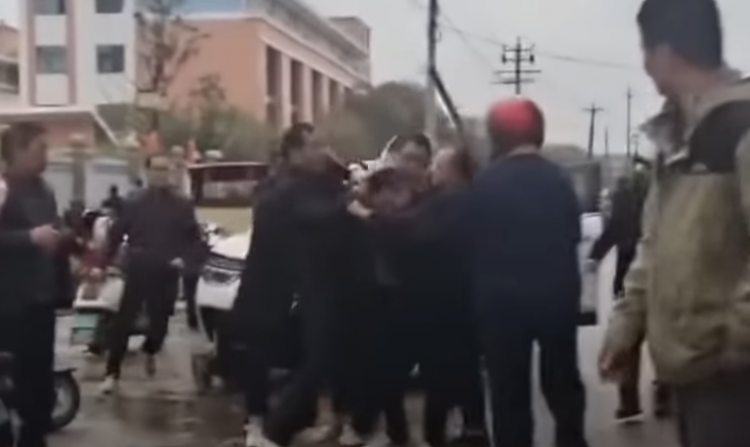In a harrowing incident on Tuesday morning, a driver in a white SUV rammed into a crowd of students and adults outside Yong'an Elementary School in Changde, a city in China's Hunan province. The crash, which occurred around 8 a.m. as students were arriving for classes, left numerous children and several adults injured, according to state media reports. While police have detained the 39-year-old driver, identified only by his surname Huang, the authorities have yet to confirm whether the incident was accidental or a deliberate attack.
Video footage circulating on Chinese social media depicted scenes of panic, with injured individuals lying on the ground as terrified students sprinted through the school gates. One clip showed bystanders confronting and subduing the driver, some reportedly striking him with sticks and rods before he was handcuffed by police. Calls for emergency assistance echoed through the crowd.
The Dingcheng district police confirmed that no one sustained life-threatening injuries and that several victims were quickly transported to nearby hospitals. "The incident is under active investigation," read an official statement. Few details have been released, consistent with China's tendency to tightly control information about violent crimes and incidents that could undermine public confidence in the ruling Communist Party's ability to maintain order.
This incident is the latest in a series of attacks in China involving vehicles and knives, often targeting schools or public gatherings. Last week, a driver in Zhuhai used his vehicle to attack a crowd at a sports center, killing 35 people and injuring 43 in one of China's deadliest mass attacks in recent years. In another case earlier this month, a former student in Wuxi launched a stabbing spree at a vocational school, killing eight people.
"Why are such incidents happening more and more frequently, and why are students often involved? What has happened to our society?" lamented one Weibo user, reflecting a growing sentiment of fear and frustration among citizens. Comments like this, however, are often quickly censored by the Chinese government, which seeks to control narratives surrounding public safety issues.
China's violent crime rate remains low compared to many countries, owing partly to strict gun control laws. Nonetheless, acts of violence using knives or vehicles as weapons persist, drawing scrutiny to underlying social pressures. Analysts point to rising economic stress and mental health issues as potential drivers of these attacks.
The timing of the Changde incident coincided with a meeting of China's top prosecutors, who discussed harsher sentencing for "major vicious and extreme crimes." The Supreme People's Procuratorate emphasized a need for severe punishments to deter such acts. "The hand of 'strictness' can never be loosened," Ying Yong, procurator-general, said on Weibo, emphasizing swift legal action against offenders.
Experts note a troubling trend of "indiscriminate revenge against society" among perpetrators. Qu Weiguo, a professor at Fudan University, highlighted that many suspects in recent attacks share a sense of being wronged, often exacerbated by mental health challenges and a lack of outlets to express their grievances. "It is important to establish a social safety net and psychological counseling mechanisms," Qu wrote on Weibo, adding that open channels for public accountability could help mitigate such tragedies. His post was removed by censors shortly after publication.
Despite these challenges, the Chinese government remains focused on projecting stability. Police statements and state media coverage stress that swift action was taken to control the situation in Changde. Still, for many parents and residents, the incident has heightened fears about safety at schools and public spaces.






